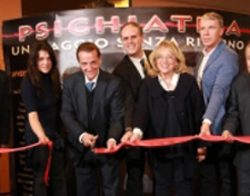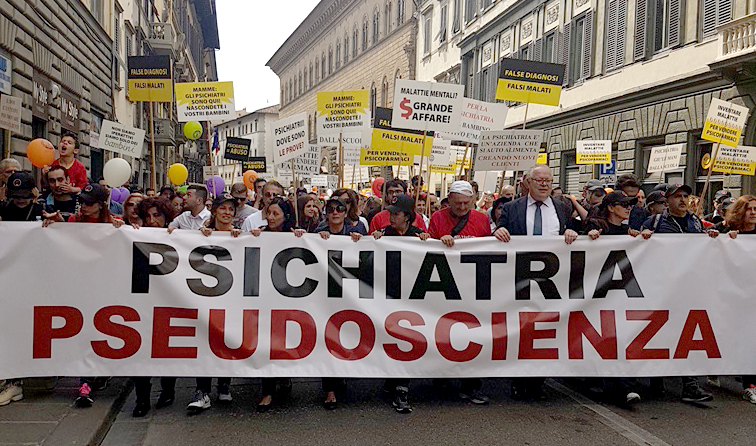By CCHR Italy
April 7, 2017
Over 2000 people from Italy, France, Switzerland, Germany, Netherlands and Denmark marched in the streets of Florence, Italy last weekend to protest against the increasing number of Europeans, especially children, being prescribed dangerous psychotropic drugs. The Italian chapter of the international mental health watchdog group, Citizens Commission on Human Rights, organized the march, pointing out that more than 33 percent of Europeans aged 18–29 have taken such drugs.
The march coincided with a European Psychiatric Association (EPA) Congress being held in Florence, with CCHR saying the conference promotes drug and other psychiatric interventions that puts Italians and other Europeans’ mental health and lives at risk.
The group marched from piazza Santa Maria Novella to piazza San Marco led by Dr. Roberto Cestari, President of CCHR Italy. Among speakers at the rally was Prof. Vincenza Palmieri, founder of the “Living without Psychiatric Drug” program: “For 30 years I have been seeing families and individuals being trapped in a system that sucks their lives away with the use of mind-altering drugs. We must spread information, knowledge and courage,” to oppose this, he said.

Left to right: Mrs. Serena Perini, Dr. Roberto Cestari, Prof. Vincenza Palmieri, Mr. Francesco Miraglia
The march was followed by the opening of a world-acclaimed exhibition on psychiatry at the Auditorium del Duomo (via de’ Cerretani 54r – Florence). Called “PSYCHIATRY: SOCIAL CONTROL AND VIOLATIONS OF HUMAN RIGHTS,” it documents the harmful history of psychiatry and its contemporary abuses. This includes Italy being the birthplace of electroshock treatment that the protesters say should be banned. More than 90 clinics in Italy still administer electroshock treatment, which was invented by Italian psychiatrist Ugo Cerletii in 1938. The exhibition is open until April 10 at Auditorium del Duomo, via de’ Cerretani 54r, with free entrance from 10:00 till 19:00.
Prof. Palmieri; Mr. Francesco Miraglia, a lawyer often engaged in defending human rights; and Mrs. Serena Perini, Councilwoman and President of the Florence Town Hall’s Committee on Peace, Human Rights, Solidarity, International Relations, Immigration and Equal Opportunities, thanked CCHR for the extensive information in the exhibit. The consensus was that without the exhibit, many mental health abuses would have remained unknown.
The worldwide concern about increasing psychotropic drug use is prompted by the drugs’ now well documented adverse effects, including suicidal and homicidal thoughts, psychosis, mania, aggression, hallucinations, severe liver damage, birth defects, diabetes, heart attack, stroke and sudden death.
Psychiatric drug consumption has been increasing in Italy over the past 10 years. In 2015 they represented the fourth highest group of drugs prescribed in the country, at an expense of 3.3 Billion Euros.
Conflicts of Interest Exposed in Psychiatric-Pharmaceutical Industry.
The 25th EPA Congress was held April 1 – 4, 2017. But as CCHR points out, the psychiatric conference had serious conflicts of interest with at least eight pharmaceutical companies sponsoring it, including Janssen, Lundbeck, Sunovion, Pfizer, Pierre Fabre Laboratories, Otsuka, Shire, and Takeda.[1] Many of these companies have paid out millions of dollars to settle lawsuits against them in the United States concerning psychiatric drugs they manufacture.
Another company that financially supported the conference was Magstim that developed transcranial magnetic stimulation (TMS).[2] TMS places a magnetic coil near the patient’s scalp passing a powerful, rapidly changing magnetic field through skin and bone, and inducing electrical currents in the brain.
Some of the conflicts of interest discussed at the Exhibit opening were:
- Silvana Galderisi, the President of the EPA, has served on advisory boards for pharmaceutical companies Eli Lilly and Janssen-Cilag. She had received honoraria from the Milan-based Amgen Dompé, the world’s largest biotechnology company;[3] Hungarian-based pharmaceutical and biotechnical company, Gedeon Richter and Oxford PharmaGenesis Ltd, which says it is the referred supplier to 7 of the top 10 global pharmaceutical companies.[4]
- Wolfgang Gaebel, a German psychiatrist addressing the EPA congress, has consulted for Janssen-Cilag GmbH, Neus, Lilly Deutschland GmbH, Lundbeck GmbH & Co., Hamburg, Lundbeck Foundation, Novartis, Wyeth Pharma GmbH.[5] He’s a Faculty Member of Lundbeck International Neuroscience Foundation.[6]
- Another speaker, Guy Goodwin, from the Department of Psychiatry, University of Oxford, and president of the European College of Neuropsychopharmacology (2013-16), has had financial ties to AstraZeneca, Bristol-Myers Squibb, Eisai, Eli Lilly, GlaxoSmithKline, Lundbeck, Sanofi-Aventis, Servier, and Wyeth.[7]
CCHR’s exhibition further exposes the conflicts of interests in the psychiatric-pharmaceutical industry. It comprises 75 panels and 13 video documentaries, covering 300 years of often painful and harmful mental health treatments.
For more information on CCHR Italy: www.ccdu.org
References:
[1] http://www.epa-congress.org/sponsorship-exhibition/sponsors-exhibitors#.WNxsu2dlCpo
[2] https://www.magstim.com/patients
[3] http://investors.amgen.com/phoenix.zhtml?c=61656&p=irol-newsArticle&ID=1059059
[4] https://www.ncbi.nlm.nih.gov/pmc/articles/PMC4002061/; http://www.pharmagenesis.com/about-pharmagenesis/#.WNxq4WdlCpo
[5] http://www.dsm5.org/MeetUs/Documents/Psychosis%202012/Gaebel-Disclosure-2012.pdf
[6] APA 2014 Scientific Program disclosure
[7] https://lirias.kuleuven.be/bitstream/123456789/239988/3/goodwin+de+hert
+polypharmancy+review+eur+psychopharm+2009.pdf



SHARE YOUR STORY/COMMENT